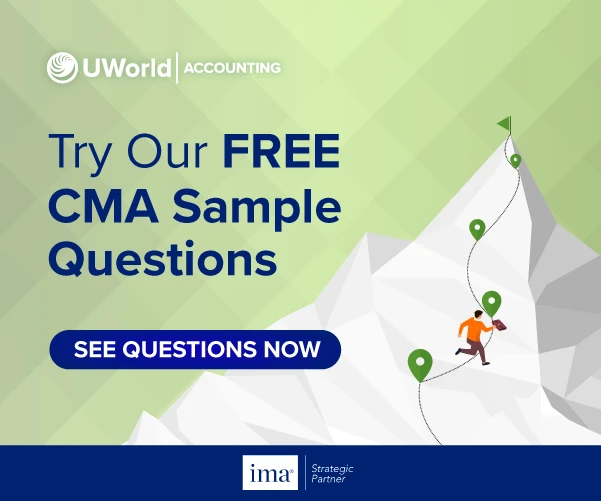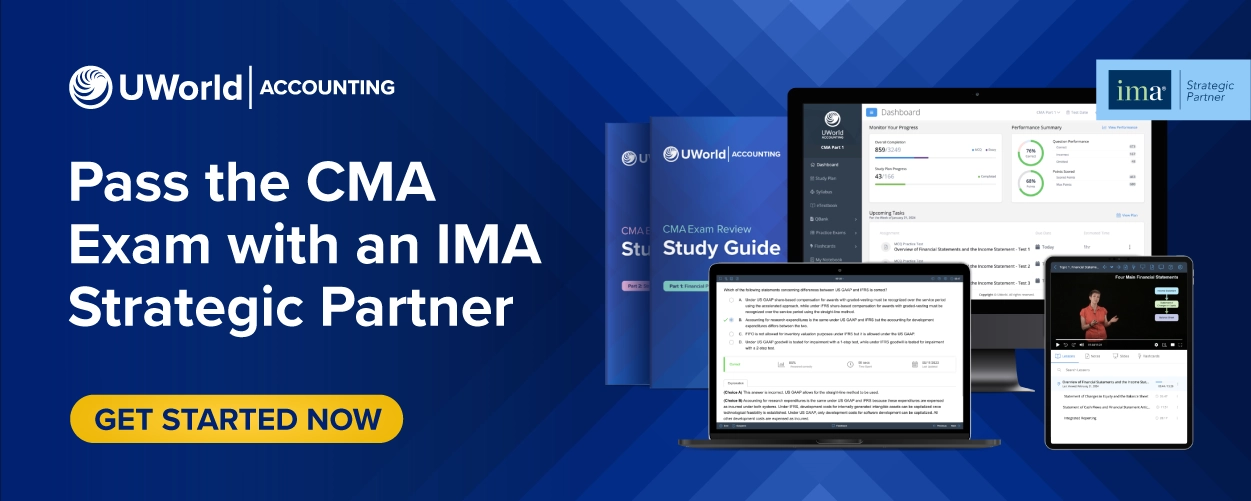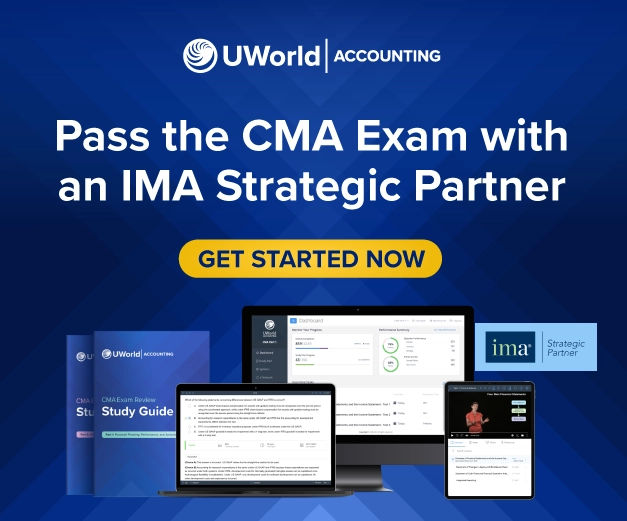All About the CMA Exam
Eligibility, Syllabus, Structure, Fees, & Career Paths

Home » CMA Review » About CMA Exam
What Is the Certified Management Accountant (CMA) Designation?
The Certified Management Accountant (CMA) designation is a globally recognized credential for professionals in management accounting and financial management. Those who pursue the CMA certification typically include professionals seeking to advance their careers in management accounting, finance, and business.
Passing both parts of the CMA exam demonstrates proficiency in these areas and signifies a commitment to excellence in management accounting.
Certified Management Accountant Quick Facts
- CMA stands for Certified Management Accountant.
- CMAs specialize in management accounting, strategic management, and business decision-making.
- CMA certification requirements include earning a bachelor’s degree, having two years of relevant work experience, and passing the CMA exam.
- CMA candidates have up to seven years to meet additional requirements upon passing.
- CMAs earn a higher average salary than CPAs and CFAs.
- A CMA review course can help you pass the exam on your first try.
CMA Exam Eligibility Requirements
Becoming a Certified Management Accountant requires time and effort—but the opportunities for career advancement are worth it. Before you get started, make sure you’re familiar with the eligibility requirements listed below.
CMA Education Requirement
There are two ways to meet the CMA education requirements:
- Earn a bachelor’s degree or equivalent
- Submit proof of other approved certification(s)
Degrees must come from an accredited university; however, non-accredited degrees can be evaluated by an independent agency for approval.
The IMA does accept some professional certifications in place of a bachelor’s degree. Approved certifications can be viewed on the ICMA Approved Certifications for the Education Requirement document.
Proof of your education or certification must be submitted to the ICMA within seven years of completing your CMA exam.
CMA Experience Requirement
Two years of relevant working experience in a financial management or management accounting role is required to obtain your CMA. You can complete your two years of work experience as two continuous years of full-time work or four years of part-time work (if you are working at least 20 hours per week in the part-time position).
Note: You do not have to meet the professional work experience requirement before you take the CMA exam, but you do need to complete it and submit proof to the IMA within seven years of passing the exam.
CMA Certification Requirement
The requirements to earn your CMA (Certified Management Accountant) designation are outlined in the seven steps below.
- Become an IMA member
- Join the CMA Program
- Study for and pass the CMA exam
- Meet education or professional certification requirements
- Meet work experience requirements
- Comply with IMA ethics standards
- Fulfill continuing education requirements
CMA Exam Registration
Follow the below steps to fulfill the exam requirement for your CMA certification.
Step 1: Become a member of IMA.
Step 2: Enroll in the CMA Program.
Step 3: Register for the exam here.
Step 4: Receive confirmation of your registration, which provides your authorization number(s), testing window(s), and the Instructions for Candidates.
Step 5: Schedule your exam appointment(s) with Prometric, IMA’s testing partner: www.prometric.com
Step 6: Show up for your scheduled exam appointment(s) with the required identification documents.
Pro tip: Be sure to schedule your appointment as soon as possible. Your authorization number is only valid for the testing window you selected.
CMA Exam Cost
The CMA exam costs $1,685 for professional members of IMA. This takes into account IMA membership fees, CMA Program fees, and exam registration fees. There are discounts available for students and added fees for rescheduling exams, so costs will vary. This number does not include cost for exam review materials, which are highly recommended to help maximize your performance on test day.
IMA Membership Fee
An annual IMA membership fee (ranging from $49 to $295, depending on your academic or professional experience) will need to be paid before you can enter the CMA Program.
Note that there is a discounted price for students of $49.
CMA Program and Exam Fees
| CMA Program Fee | |
|---|---|
| Professional Member Fees | Student/Academic Member Fees |
| CMA Entrance Fee (non-refundable): $300 | CMA Entrance Fee (non-refundable): $225 |
| CMA Exam Fee (Updated CMA exam fees go into effect on September 1, 2025 globally, excluding China.) |
|
| Professional Member Fees | Student/Academic Member Fees |
|
CMA Exam Fee: $545 per part Rescheduling Fee*: $50 |
CMA Exam Fee: $407 per part Rescheduling Fee*: $50 |
*Exam rescheduling is available if you do so more than 30 days prior to your scheduled appointment. You will be able to move the date to a later date within the same two-month testing window.
| Total CMA Certification Costs | ||
|---|---|---|
| CMA Exam Fees and License Costs | Fees and Costs for Professionals | Fees and Costs for Students |
| IMA Membership Fee | $295 | $49 (one-year membership) |
| CMA Program Fee | $300 | $225 |
| Exam Registration Fee (per part) | $545 | $407 |
The CMA Entrance Fee covers:
- Credential review for education qualification
- Credential review for experience qualification
- Six months of access to the CMA Exam Support package, which includes printable practice questions
- Final score report
- Performance feedback reports for candidates who do not pass
- Personalized, numbered certificate for office display
- Congratulatory notification to employer or others, if desired
Schedule Your CMA Exam
As mentioned above, after you register for the exam and receive confirmation of your registration, you can then schedule your exam appointment(s) with Prometric, IMA’s testing partner.
CMA Exam Retake Policy
Retaking the Certified Management Accountant (CMA) exam is a common scenario for candidates aiming to achieve this prestigious certification. Knowing when to retake the exam depends on individual circumstances, such as exam preparation, performance, and personal goals. If you fail one or both parts of the CMA exam, don’t worry—you have the opportunity to retake the exam in subsequent testing windows, and you only have to retake the sections you did not pass.
We strongly suggest you carefully evaluate your performance and readiness before deciding to retake the exam. It's essential to identify areas of weakness and develop a solid study plan to address them effectively. We advise you to retake the exam in the next available testing window to maintain your momentum.
We recommend candidates study for 12-15 hrs per week for 6-8 weeks, making that 72 – 120 study hours per section.
Now, if you were to break that out into 12 weeks = 8 hrs studying per week.
Most people attempt to condense their studying into much tighter timelines, which can sometimes lead to stress and last-minute cramming. So it’s best to find CMA study materials that can help with time management, study scheduling, and engaging lessons, like UWorld CMA Exam Review.
CMA Exam Testing Centers
Both parts of the CMA exam are administered through Prometric Testing Centers or remotely using Prometric’s ProProctor service. There are thousands of testing centers in over 180 countries, so candidates will find many in-person CMA exam locations throughout the U.S. and internationally.
To locate a Testing Center and schedule exam appointments, visit https://www.prometric.com/exams/icma.
CMA Exam Format
As stated in the CMA Handbook, each exam part consists of:
- 100 multiple-choice questions.
- Two 30-minute essay questions.
You will have four hours to complete each exam part, but those four hours are broken down into:
- Three hours for the multiple-choice question section.
- One hour for both essays.
For the essay section, you’ll need to answer 10 – 12 written response or calculation questions based on scenarios describing business situations.
There are a few other things you need to know before attempting the essay section of the CMA exam.
- The essay section starts after you complete the multiple-choice section OR after three hours—whichever comes first.
- Once you complete or exit the multiple-choice section, you cannot go back.
- You must score at least 50% on the multiple-choice section to be eligible to move onto the essay section.
The essay sections are graded offline after you complete the exam, so you will not get an immediate notification of whether you passed or failed.
Once the essay results are in, that score will be added to your multiple-choice score. Exam results are typically posted six weeks after the end of the month the exam was taken in.
CMA Exam Topics and Weightage
The CMA exam tests your comprehension of accounting, financial analysis, and business knowledge.
- CMA Part 1: Financial Planning, Performance, and Analytics
- CMA Part 2: Strategic Financial Management
Note: You sign up for and take the two parts of the CMA exam separately. You may take Part 2 before Part 1.
Each exam covers different topics based on the percentages below, showing how much coverage you can expect on that topic in the exam.
Part 1 of the CMA Exam Includes:
- External financial reporting decisions (15%)
- Planning, budgeting, and forecasting (20%)
- Performance management (20%)
- Cost management (15%)
- Internal controls (15%)
- Technology and analytics (15%)
Part 2 of the CMA Exam Includes:
- Financial statement analysis (20%)
- Corporate finance (20%)
- Business decision analysis (25%)
- Enterprise risk management (10%)
- Capital investment decisions (10%)
- Professional ethics (15%)
CMA Exam Duration
Both Part 1 and Part 2 are four hours long, giving you a total of eight hours of testing time spread across the two exam sections.
Part 1 - Financial Planning, Performance, and Analytics
Exam Duration: 4 hours
No break is allowed during this 4-hour testing window.
Part 2 - Strategic Financial Management
Exam Duration: 4 hours
Optional 30-minute break after 2 hours of testing.
Having a clear understanding of the exam timing for each part allows you to pace yourself appropriately and avoid running out of time on either CMA exam.
CPA vs CMA vs CFA
Determining the hardest exam among the Certified Public Accountant (CPA), Certified Management Accountant (CMA), and Chartered Financial Analyst (CFA) designations is subjective and depends on various factors including individual strengths, backgrounds, and career aspirations. However, many professionals consider the Chartered Financial Analyst (CFA) exam to be the most challenging due to its rigorous curriculum, extensive study materials, and demanding exam format.
The CFA exam covers a wide range of complex financial topics including investment analysis, portfolio management, and ethical standards, requiring candidates to demonstrate a deep understanding of financial concepts and their practical applications in real-world scenarios. The multi-level structure of the CFA exam, with three levels of testing, adds to its difficulty and demands significant dedication and preparation to succeed.
| CPA | CMA | CFA | |
|---|---|---|---|
| Exam Structure | 4-part exam totaling 16 hours of testing | 2-part exam totaling 8 hours of testing | 3-part exam totaling 13.5 hours of testing |
| Recommended Study Hours | 550 hours | 180 hours | 900 hours |
| Pass Rate | 50% | 45% | 46% |
| Fees (excluding study materials) | $1,500 | $1,685 | $2,400 – $4,590 |
| Annual Continuing Education | 40 hours | 30 hours | 20 hours |
| Experience Requirements | 1-2 years of work experience under licensed CPA | 2 years of work experience in financial management or cost accounting | 4,000 hours of work experience in investment decision-making |
CMA Exam Results
Performance Reports are sent via email from Prometric to all candidates who take an exam part. The performance reports are emailed approximately 14 days after exam results are posted to the candidate’s profile.
Candidates who do not pass the exam will receive a report that indicates their performance on each of the key topic areas in the multiple-choice section as well as their overall performance on the essay section of the exam.
Pro tip: Use your performance ratings to identify which areas were your weak points on the exam. The areas of “marginal” performance are the low-hanging fruit that you can use to boost your score over the minimum 360 in the next go-round.
The CMA Exam Scoring Scale
The CMA exam has a unique scoring system that can sometimes be confusing for candidates. Here’s everything you need to know to correctly interpret how your CMA exam score is weighted.
- The multiple-choice questions section = 75% of the total score.
- Essays = 25% of the total score.
- To be able to take the essay section, you must score at least 50% on the multiple-choice section.
CMA Exam Grading
| Type | Score Pattern | Score |
|---|---|---|
| MCQ | 75% | 375 |
| Essay | 25% | 125 |
| Total | 100% | 500 |
CMA Passing Score and Pass Rates
Parts 1 and 2 of the CMA exam are scored on a scale of 0 to 500. To equate all scores for all forms of the exam, the scores for each part are placed on a scale from 0 to 500. On this scale, a score of 360 represents the minimum passing scaled score. The scaled score allows candidates to know how they performed with the passing standard of 360.
The average pass rate is around 45-50%, so this is not an easy certification to get. However, with the right prep tools, you can set yourself up to pass on the first try.
What to Expect on Exam Day
Before arriving at the testing center, make sure you double-check your exam appointment details, including the location and time. Upon arrival, you’ll be required to present valid identification and may undergo security procedures, such as metal detection or bag inspection.
Once checked in, you’ll be directed to your assigned testing stations equipped with a computer and necessary exam materials. Before the exam begins, you’ll get instructions on the exam format, time limits, and navigation of the testing interface.
Remember to approach exam day with confidence—you’ve got this!
Identification Requirements
Below are the identification requirements for CMA exam day.
Primary ID (You must present one of the following):
- Valid passport with photograph and signature
- Valid government-issued driver's license with photograph and signature
- Valid military ID with photograph and signature
Secondary ID (You must also present one of the following):
- Valid credit card or debit card with a name and signature
- Social security card
- Valid company ID or employee ID
- Valid university/college ID
It's crucial to carefully review the identification policy and ensure you have acceptable primary and secondary IDs ready when you arrive at the testing center. Failure to meet these identification requirements could result in being turned away and missing your exam appointment.
What to Bring on CMA Test Day
Here's a list of items you should bring on exam day:
- Valid Form(s) of Identification - Two forms of ID are required, including one primary ID like a driver's license, passport, or military ID.
- Exam Admission Notice - Print out and bring the notice from Prometric confirming your exam appointment details.
- Exam ID and Launch Code - You'll need these codes provided by IMA to launch the CMA exam at the test center.
- Registration Confirmation - Bring any confirmation printed from your IMA account showing exam registration.
- Prescription Medications - If needed, medications are allowed but must be inspected.
- Sweater/Jacket - Test centers can be cool, so dress in lightweight layers.
- Snacks/Beverages - You can bring snacks and drinks in a transparent container to have during breaks.
Do’s and Don’ts on CMA Test Day
Things to Do on CMA Exam Day:
- Arrive at the test center early (at least 30 minutes before your scheduled exam time)
- Bring two proper forms of identification (e.g. driver's license, passport)
- Review the test admission requirements and procedures
- Visit the restroom before check-in if needed
- Have your Exam ID and Launch Code ready to start the exam
- Use the basic calculators and whiteboards/markers provided at the testing stations
- Take full-timed breaks between exam sections to recharge
Things NOT to Do on CMA Exam Day:
- Don't be late or you may not get seated for the exam
- Don't bring unauthorized items (cell phones, notes, study materials, etc.)
- Don't try to access unauthorized websites/software during testing
- Don't talk to or disturb other test-takers
- Don't bring outside calculators - only use the basic on-screen one provided
- Don't leave the testing room for unauthorized breaks
- Don't panic—the exam is challenging but you prepared for this!
Following the proper protocols and avoiding violating any rules is crucial on exam day. Stay calm, focused, and do your best!
Earning the CMA Certification
Passing the two-part CMA exam is a huge accomplishment, but there are still a few steps to go through before officially becoming a Certified Management Accountant. Here's what you need to do:
Apply for Certification
Once you've passed Part 1 and Part 2 of the CMA exam within the 3-year window, you can apply for certification with IMA (Institute of Management Accountants). You'll need to submit:
- Your exam scores from Prometric
- Completed application for admission
- Current resume or biography
- Any remaining documentation needed to verify education and experience requirements
Experience Verification (If Needed)
If you haven't already verified your two years of qualifying management accounting experience before passing the exams, now is the time to submit documentation like:
- Job descriptions from employers detailing roles/responsibilities
- Letters from managers/supervisors validating experience
If you had provisional entrance to the exams based on education alone, you cannot be fully certified until the experience requirement is met.
CMA Certificate and Membership
Once your application is approved and your experience is verified, you'll be granted the official CMA certification. IMA will send you:
- CMA certificate package with documents
- Award notification letter
- CMA logo, stamps, etc.
You must also join as an IMA member to maintain active CMA status and uphold ethics requirements.
Fulfill the Experience Qualification
Gaining the required professional experience is an important part of the journey to earning your Certified Management Accountant (CMA) credential. The experience requirement ensures that CMAs not only have a strong academic foundation but also real-world expertise in applying management accounting principles.
Candidates must accrue two years of professional experience in management accounting or financial management roles. This experience can be completed before or within seven years after passing the CMA exam.
Apply for Your CMA Certificate
Once you've met the education and experience requirements to become a Certified Management Accountant (CMA), you're ready to apply for the CMA certificate with the Institute of Management Accountants (IMA).
The application process involves providing documentation to verify your eligibility, registering for the CMA exam, scheduling your test dates, and submitting payment for associated fees.
Continued Professional Education (CPE) for CMA
IMA requires you to meet certain continuing education requirements to retain your status as a CMA.
To uphold your certification, every year, you must complete 30 hours of continuing professional education (CPE), of which at least two hours must be in ethics.
To learn more about the various ways you can complete these hours—like through self-study courses, being a speaker, taking computer software package examinations, and more—read IMA’s Continuing Education Requirements and Rules.
Ethics Requirements for CMAs
You will also need to understand and abide by the ethics and standards put forth by IMA surrounding topics like honesty, confidentiality, credibility, and integrity. In addition to adhering to these ethical standards, two of your annual 30 hours of continuing education must be in the area of ethics.
To learn more about these standards and how to adhere to them, view IMA’s Statement of Ethical Professional Practice.
Certified Management Accounting Careers
Management accounting is a varied and growing profession that, at its core, involves using specialized accounting expertise to assist in management decision-making and planning.
Sounds great, but what does a career in management accounting look like?
While other areas of accounting are focused on financial auditing and reporting or investments, management accounting serves a central strategic role for businesses. According to the IMA (Institute of Management Accountants), that’s because management accountants have specialized skills in financial planning, analysis, control, decision support, and professional ethics.
CMAs (Certified Management Accountants) contribute to the success of a business in many unique ways. They can:
- Advise managers about the financial implications of projects.
- Explain the financial consequences of business decisions.
- Formulate business strategies.
- Monitor spending and financial controls.
- Conduct internal business audits.
- Explain the impact of the competitive landscape.
- And much more.
Above all, CMAs bring a high level of professionalism and integrity to businesses, as demonstrated by their certification and IMA membership.
Benefits of Obtaining the CMA Certification
High Demand for CMAs
- CMAs are a hot commodity with only around 40,000 active CMAs compared to 670,000 CPAs.
- The CMA designation makes professionals stand out and more likely to land coveted, high-paying positions.
Higher Earning Potential
- CMAs in the Americas earn 25% more total compensation than non-CMAs.
- CMAs in lower management earn 90% more median base salary than non-CMA counterparts.
- The CMA credential is useful for negotiating higher salaries.
International Acclaim
- The CMA is the fastest-growing global certification.
- CMA skills in financial accounting, strategic management, decision analysis, etc. are highly valued worldwide.
Practical Skills
- CMAs demonstrate advanced skills in financial planning, performance, analytics, and strategic management.
- These practical business skills help CMAs truly understand organizational needs.
Path to Powerful Positions
- CMAs are prepared for leadership roles like CFO and high-level management.
- The majority of CMAs worldwide agree the designation benefits career advancement.
Management Accounting Jobs
Management accountants can work as cost accountants, budget analysts, internal auditors, or financial analysts.
They may advance to positions such as an accounting manager, chief cost accountant, budget director, or manager of internal auditing.
Some become controllers, treasurers, financial vice presidents, chief financial officers, or corporation presidents.
While the CPA and CFA are well-known and respected designations, earning the CMA can lead to even higher earning potential in many corporate finance and accounting roles.
According to the latest IMA Global Salary Survey, CMAs in the United States have a median total compensation of $124,000 - over 25% higher than their non-CMA counterparts. This figure outpaces the median U.S. salary for CPAs of $119,000 reported by the AICPA. Additionally, CMAs often exceed the average pay for investment professionals with the CFA charter. CFAI reports the average compensation for CFA charterholders in the U.S. is around $113,000.
With their specialized skills in strategic planning, decision analysis, and performance management, CMAs are highly valued in top financial leadership roles across industries. The unique expertise demonstrated by CMAs allows them to command salaries that meet or exceed other esteemed certifications.
Conclusion
Earning the CMA credential through IMA represents a challenging yet rewarding achievement. The skills gained make CMAs uniquely valuable assets ready to drive operational success, financial performance, and sustainable growth in any organization. Whether you want to enhance the value you bring to your current position or expand your career potential, the CMA certification will help you advance your career in management accounting.
Frequently Asked Questions
What is on the CMA exam?
Part 1 of the CMA exam focuses on Financial Planning, Performance, and Analytics. It covers topics such as External Financial Reporting Decisions, Planning, Budgeting and Forecasting, Performance Management, Cost Management, Internal Controls, and Technology and Analytics.



